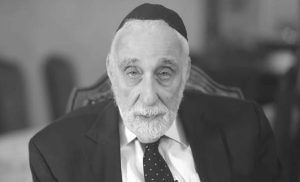Dr. Marvin Schick – A Second Yahrzeit Appreciation

Today, Sunday, June 1st marks the 2nd yahrtzeit of our former Cross-Currents contributor, Dr. Marvin Schick Z”L.
Dr. Schick was a unique figure in American Jewish life. He was a scholar and intellectual who was also a firebrand, a fierce protector of the Orthodox community who was also unafraid to express his criticisms, a writer and a speaker who was first and foremost a doer, a university professor, and a devoted and loyal follower of his guidestar, Rav Aharon Kotler ZT”L. The obituary run by the New York Times shows his prominence in the non-Orthodox world.
Dr. Schick was involved in a wide-range of communal activities. In the 1960s and 1970s he led the fight to protect the rights of observant Jews, to combat discrimination against Shabbos observers and for aid to parochial schools. He did so through his mighty pen (producing an avalanche of op-eds), and as a member of city and state administrations in NY. Jewish education was the cause closest to his heart. When the government was on the verge of announcing that all yeshivos were acting illegally by moving general studies education to afternoon hours, he was one of those most responsible for getting it to do an about-face, thereby saving Torah education. (I’m not sure who the others were, if any.) As President of the Rabbi Jacob Joseph School for 45 years, through his work with the Avi Chai Foundation and in countless other ways, his concern for Jewish education transcended all boundaries. He ignored other boundaries as well. He worked with and for the interests of both charedim and the Modern Orthodox, but was affiliated with no particular organization. It was all lishmah.
To commemorate Dr. Schick’s yahrtzeit, we are pleased to provide Cross-Currents readers with this speech about Jewish education that he delivered at a Torah Umesorah dinner 30 years ago. It is a terrific illustration of his passion, intellect and idealism.
Dr. Schick and his speech were introduced (in Yiddish) by Rav Elya Svei ZT”L, and we offer Rav Svei’s remarks as well.
Rav Svei’s introduction:
Dr. Schick:




Thanks for sharing the recording of my esteemed uncle, ZTL. An article I wrote after his petirah can be found here: https://jewishlink.news/features/37695-an-appreciation-of-my-uncle-marvin-schick-z-l-along-with-timely-thoughts-on-a-viral-opportunity?format=amp
Apparent typo in date of Yahrtzeit. I assume it should read May 1 rather than June 1.
Very powerful speech! “His lips speak from the grave.”
“He ignored other boundaries as well. He worked with and for the interests of both charedim and the Modern Orthodox, but was affiliated with no particular organization.”
Interestingly, Avi Schick used the same word, an absence of “boundaries” to describe his father in the Winter 2021 issue of Jewish Action about shtadlanim(see link):
“Dr. Schick was not regarded as a representative of any particular Jewish organization, says Dr. David Luchins, longtime chair of the Political Science Department at Touro College. Though he spent more than sixty years in Jewish communal service, “Marvin was an outsider,” not a paid leader of any Jewish organization or beholden to any particular parochial agenda or single constituency.
“He didn’t see labels. He didn’t see boundaries,” says Avi Schick.
https://jewishaction.com/cover-story/shtadlanim-dr-marvin-schick-1934-2020/
Of course, Dr. Schick had some boundaries. While I recall him for example suggesting in a Jewish Week article that Hatzolah ambulances should include non-Orthodox volunteers as well, institutionally, he navigated the denominational divide in his unique way, as he described in a 2010 Jewish Press article, linked below:
“During the 1960s, as well, I was active in Agudath Israel, as I had been since my teens, and also in the Orthodox Union, representing it on public issues. This dual commitment was and remains unique and reflected my determination to work for the entire community. When, however, Rabbi Samson R. Weiss, the Orthodox Union’s immensely gifted executive vice president, asked me to become an officer, I demurred, saying that while I would work voluntarily for the organization, an officer must take responsibility for the group’s policies and I could not take responsibility for Synagogue Council membership.”
https://www.jewishpress.com/indepth/front-page/a-question-of-identity/2010/10/13/
I would attend from time to time a long-running Friday night lecture series in Boro Park’s Bnei Yehudah(R. Yisrael Kirzner’s shul), which I believe Dr. Schick was involved in organizing, and was an annual speaker as well. Below are some of my recollections which are also reflected in Dr. Schick’s published writings, as I hope to reference in a separate comment.
As mentioned in the Torah Umesorah dinner audio linked here, Dr. Schick had a close connection to R. Aharon Kotler. He spoke at the lectures about the Shabbos meals he ate in a private room at the Agudah and Zeirei conventions with Rav Aharon. On some occasions R’ Aharon would ask Dr. Schick about his college study and graduate work.
I remember Dr. Schick saying at a lecture ten or so years ago how Orthodoxy was less divided in his day. Rabbi Kirzner, an editor of R’ Hutner’s Pachad Yitzchak and an NYU economics professor who has also been on the short list to win a Nobel Prize in economics, then spoke. He warmly thanked Dr. Schick, as he always did after his lectures, but added that there were plenty of divisions which he remembered from older times as well.
R. Kirzner then told an apocryphal story of a rabbi who addressed a young couple under the chuppah, blessing them that they should “become one”. This immediately led to their first argument, as each said to the other, “you need to become me”! I think R. Kirzner used this to illustrate the challenge of achdus, in that each side needs to retain its identity, just as the couple in the story.
In a following year, Dr. Schick said that each generation needs to be appreciated, in the context of the greater participation of yeshiva students in higher education in 1950s as compared to today.
In “Going To College: A Personal Reminiscence”, published in the Jewish Press in 2015, Dr. Schick writes of appreciating each generation, as he mentioned in the Bnei Yehudah lectures:
https://www.jewishpress.com/indepth/front-page/going-to-college-a-personal-reminiscence/2015/03/11/
This is Dr. Schick’s take in 2010 on some aspects of Orthodox unity in the US, which would need to be updated(he discusses Israeli Orthodoxy as well),from a Jewish Press article, “A Question Of Identity.” He mentioned something similar in the exchange I referenced with Rabbi Kirzner:
“That was a time when intra-Orthodox conflict was intense over membership in the Synagogue Council together with Conservative and Reform rabbis and other issues. COLPA had remarkable success in court and in legislative bodies. This is in contrast to today’s situation where, though the barriers to intra-Orthodox cooperation have been removed or reduced, there is in fact little cooperation. In the recent Supreme Court case regarding a conservative Christian student group at Hastings Law School in California, Agudath Israel, the Orthodox Union and Young Israel each submitted separate briefs. Is it any wonder why, despite our growth, our legal and legislative achievements have been puny when compared with what was accomplished decades ago when American Orthodoxy was able to unite on public-affairs matters?”
https://www.jewishpress.com/indepth/front-page/a-question-of-identity/2010/10/13/
In one of the interesting articles on his blog, linked below, Dr. Schick discusses:
— High degree of young lay participation in early Agudah conventions as “the Gedolei Torah… listened and seemed to enjoy watching young men participating with such passion… It was legitimate to engage in debate, as had occurred in pre-Holocaust Europe at the Knessiah Gedolahs and conferences. This was in no way antithetical to the ideal of Daas Torah.”
— R. Hutner encouraging some of his best students to be involved in Bnei Akiva so that it would be oriented in the right direction.
— Rav Aharon asking him about his college study and graduate work.
http://mschick.blogspot.com/2012/01/
Dr. Schick described in a Matzav article his Shabbos meals with Reb Aharon in a private room at the Agudah and Zeirei conventions where “Rav Aharon would at times reminisce about his experiences in Slabodka and Kletzk…” The article also mentions R. Aharon asking him about his college and graduate studies:
https://matzav.com/dr-marvin-schick-zl/